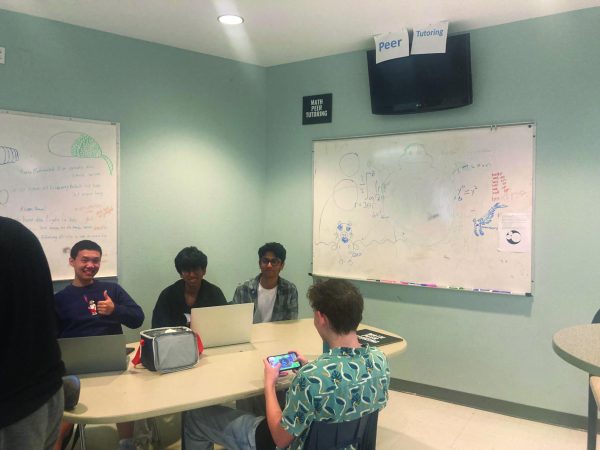A look inside student minds
How do students feel about mental health and wellness?
February 20, 2018
LASA is known both for its academics and for the stress its students can experience. While at many schools students can be heard bragging about weekend plans and relaxing during lunch, LASA has a different kind of culture: one that encourages advancement. But it can take a toll on student’s mental and emotional health.
Sophomore Novella Marble said that she notices a paradigm in the way students approach mental illnesses because students feel as if being stressed is a commitment when they choose to attend LASA.
“You can’t say to LASA, ‘We need to be assigned less homework’ because that’s the purpose of LASA. It’s like, to choose to come to LASA is to choose to sacrifice your mental health in a way,” Marble said. “I think it could be improved if they restructured the entire school because the current structure just encourages kids to compete with each other. That’s just not healthy for teenagers to experience every day.”
LASA wellness counselor and former school-based therapist Dr. Susan Palacios and wellness counselor Marissa Rivera are working to adapt existing wellness programs to include input from students. The fall semester of 2017 saw heightened stress for many students, due in part to losses within the student body. During this time, students, parents, and faculty members alike recognized the need to focus more on the wellbeing of the student body and towards providing students with effective, healthy ways to cope.
“It’s important to not ever react to something, but it’s important to respond and it’s important to do so in the way that’s most productive and the most effective,” Palacios said. “There’s a lot of brainstorming going on right now.”
Wellness counselors connect with students in many ways, including classroom presentations and listening to student feedback. These presentations cover topics such as depression, anxiety, and healthy sleep and self care behaviors. The wellness team hopes to promote helpful skills and target potential challenges that students may struggle with.
“We’re really trying to create more opportunities for discussion in our presentations like small group discussions instead of just us talking at students,” Rivera said. “Part of that is that I don’t know what it’s like to be a teenager right now. At the end of the day, if research isn’t relevant for our students or authentic, then no matter how much the wellness team does, it’s kind of pointless.”
In 2014, the LASA counseling team put together a comprehensive wellness survey in the hopes of gaining student feedback that would allow the team to guide their programming to hone in on specific concerns that students had. Results showed that the biggest concerns for students were anxiety and stress, which led the counseling team to implement more fun and informal stress relief activities, in addition to more traditional counseling.
“In the last few years we’ve tried to do more fun things like kindness week and having Bruce Wayne here and bringing in the therapy dogs for study breaks and sleep weeks,” Rivera said. “Those things are fun, but there’s also science behind them. Expressing gratitude changes the brain and therapy dogs help bring down cortisol levels, so we try to come in, it that way but a lot of what we do takes place one-on-one.”
Counselors also try to reduce some of the stigma that surrounds going to counseling by becoming involved on campus in different roles, such as being a coach or a club leader. Palacios said the hope is that students will be able to connect with counselors in neutral and fun ways.
“I’m hearing a lot of kids talking about wanting to reach out more to their counselors, and I’m hearing about people wanting to just be there for their friends and create a culture where their friends feel safe and comfortable talking,” Palacios said. “I think relationships are the key to that, because if we can develop strong enough relationships with the students on the campus then there’s not that hesitation to come talk to us because the relationship is already there. Counseling is about relationships.”
Until January, LASA was the only school in the district to have wellness counselors on staff. Although Anderson recently created a wellness counselor position, LASA remains unique as the only school with two full time wellness counselors. This is especially beneficial considering that LASA students often take on highly stressful course loads and come from different backgrounds and areas of Austin.
“[Our counseling team is] not by accident,” Rivera said. “Before Ms. Crescenzi was in admin she was in counseling, so she very much values what counseling can do. Our teachers are also massive supporters. We would not be able to have the counseling program we have if teachers weren’t on board with letting kids out of class when we need to see someone.”
Rivera said that many students mask their struggles and instead pretend that they can do a lot with little effort or stress. This, along with other factors, she said, contributes to students being unwilling to acknowledge their own feelings.
“In reality there are a lot of people who aren’t getting the kind of sleep they need and are struggling with mental health or are having breakdowns,” Rivera said. “If we don’t have open and honest conversations about that then people continue to feel the need to hide that struggle and not get help. I think people masking those issues creates this cyclical pattern where everybody thinks everybody else is doing okay and that makes it harder for someone to say, ‘Hey, I’m not okay’.”
Most of the counselor’s approach is based on three theoretical models: dialectical behavioral therapy, interpersonal neurobiology, and mindfulness-based stress reduction. As a team, the counselors strive to stay up to date with the latest case studies and research articles.
“When Ms. Butler started this program six years ago, it was based on research, and really it’s just been a matter of tweaking and fine tuning ever since,” Rivera said. “It just informs the language that we use to talk about things and really helps us to justify why we do fun things like therapy dogs and gratitude week and sleep week.”
It’s not just counselors and administrators working to create a healthy environment at LASA. Students like sophomore Brooke Taylor and senior Mia Cooper have spoken out about their experiences and want to positively contribute to the conversation about mental health and wellness at school by giving students a safe space to have conversations about their struggles.
“One thing that LASA has that people maybe don’t realize is that we have students that are passionate about this and really wanting to lead the way which excites me,” Rivera said.
Taylor started LASA’s Wellness Club to help her peers de-stress and create a space to be honest about how they feel. Each month, the club focuses on activities to improve student wellness like making stress balls while eating healthy snacks and listening to relaxing music.
“I think spreading awareness, like we are doing, and just making everyone aware of what they’re feeling and the signs of depression really helps so that people don’t feel so alone,” Taylor said. “I think we are aware of mental health issues, but we ignore it when it’s ourselves.”
Taylor feels as if the heavy workload at LASA contributes heavily to student stress, especially for competitive students, and hopes that they will take time for themselves and get help if needed.
“I think [the LASA community] tries to be supportive of [mental illnesses], but a lot of times students are really competitive and they aren’t able to focus on themselves and they just dismiss their feelings and say, ‘Everyone deals with stress here’” Taylor said.
Students have also taken charge in developing a way to share their voices. Cooper, along with seniors Alex Cohan and Ashley Thomas, began the Start The Conversation project after feeling that students did not have a platform to talk about how the student deaths and mental health affected them. While Cooper felt as if the counselors were a great resources, students also needed to be able to share their voices on issues that impacted them.
“I want Start The Conversation to be a platform for student to student interaction to spread the message that you are not alone,” Cooper said. “I think that’s the most important part is knowing that there are other people around the school and in the larger community struggling with mental illnesses as well, and that we are here to support one another through it.”
If there’s one message Rivera wants to get out to students, it’s that the staff is here to help and are open to any ideas students have.
“Our LASA counseling team is a super competent team with a lot, a lot of experience so I think we do a lot of things right, but we are always wanting to improve and LASA students are our main customers,” Rivera said. “We want to know what it is that students want to change and how we can better as a counseling program or help to influence our school culture in more positive ways. We’re always open to feedback.”










